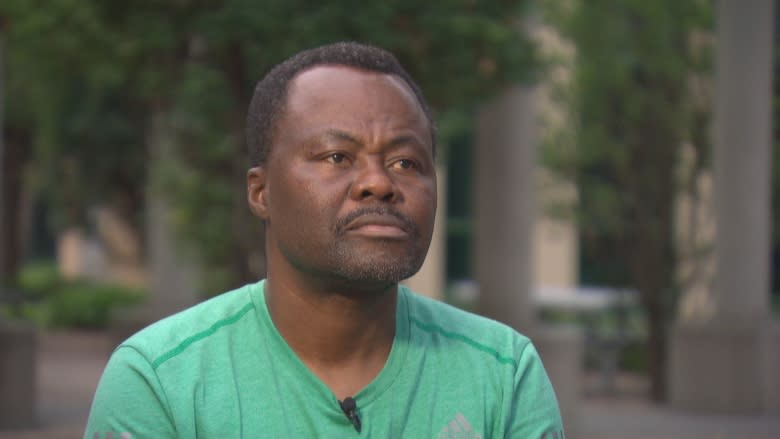Woman accuses former director of centre for francophone newcomers of sexual misconduct
A former client is accusing Georges Bahaya, the former director of Edmonton's centre for francophone newcomers, of sexual misconduct.
Nana Ngandu, who is originally from the Democratic Republic of the Congo, said she was victimized by Bahaya when she was a client at the Centre d'accueil et d'établissement du Nord de l'Alberta (CAE) in 2010.
The organization offers support and services to French speakers who have recently moved to northern Alberta.
"He approached me, he took both his hands and placed them on my breasts," Ngandu recalled of her alleged encounter with Bahaya.
Ngandu said she felt compelled to break her silence after hearing another woman come forward to accuse Bahaya of inappropriate behaviour.
"I commend her," said Ngandu. "She did what she had to do, even when it wasn't easy."
The CBC is calling the woman who spoke up first Emilie. She was Bahaya's former employee at the centre.
The CAE told Radio-Canada that Bahaya was fired without cause, in the interest of the people who obtain services from the centre.
His management, professional competence and dedication to helping newcomers were without reproach, said the CAE.
Bahaya chose not to comment on the allegations reported by Radio-Canada in June, because of an ongoing independent investigation.
Allegation of sexual misconduct
When Ngandu arrived in Edmonton in 2010, she was going through a divorce while looking after her two children.
She turned to the CAE for help finding a job and a place to live.
The employees who took on her case were helpful, said Ngandu, but the situation changed when Bahaya asked her for a meeting in his office.
"He knew my case, my story, why I was there. He was asking me questions," said Ngandu. "He wanted to know if the people who were responsible for my file were doing their job properly."
As the conversation progressed, Ngandu said Bahaya moved closer to her.
"I didn't like that he was getting closer to me like that," she said. "It made me uncomfortable."
She alleges that Bahaya told her that he could help her, if she was willing, and allegedly placed his hands on her breasts.
"He said, 'If you sleep with me, only once, I will help you with your kids,' " Ngandu said.
She alleges that Bahaya took advantage of his position of authority by trying to use her vulnerability against her.
"I realized that he wasn't interested in my file, he was only interested in sex," said Ngandu.
The woman alleges that she told Bahaya to stop and left his office. She said she was never alone with him again.
Radio-Canada was unable to independently corroborate Ngandu's account of the events, since there are no direct witnesses.
Bahaya responded to the allegations through his lawyer, Shirish P. Chotalia.
"The allegations are absolutely false and defamatory and arise out of community politics," Chotalia wrote in an emailed statement.
She also wrote that Bahaya could prove the allegations were false, but Bahaya has refused to share this evidence or grant an interview to Radio-Canada.
The president of CAE's board, Paul Dubé, also refused to grant an interview, saying his lawyer had advised against it.
Backlash at the centre
Radio-Canada contacted the two CAE employees who were responsible for Ngandu's file at the time, Brigitte Ngezahayo and Désiré Batumike.
Ngezahayo said she spoke with her client after the alleged incident.
"She told me about it, but didn't go into the details because she felt embarrassed," said Ngezahayo. "She was very angry."
Ngandu said she didn't share her story with anyone other than Ngezahayo at the time, including police, because she was afraid of being judged.
"In my culture, when something like that happens, the woman is immediately accused," she explained. "They say that she provoked the man."
Ngandu remained a client of the centre after her alleged encounter with Bahaya.
"I really needed help, I didn't know any other organizations, and I didn't know the city," she said.
She claims the services she received afterwards were of a lesser quality.
"Georges said that we were treating Nana like a princess," recalled Batumike. "He wanted us to wrap up her file."
Shortly afterwards, Batumike and Ngezahayo were no longer responsible for Ngandu's file, they said.
The centre receives its funding from Immigration, Refugees and Citizenship Canada. In a statement emailed Aug. 15, the ministry said it was taking the allegations against Bahaya seriously, but declined an interview.
Ngandu, who moved to Ottawa in 2012, said Bahaya's alleged sexual misconduct has had a negative impact on her life.
"It really made me disgusted by men," she said, in tears. "I saw all men in the same light. I no longer wanted to feel like a woman, to feel loved."
She said she hopes that breaking her silence will encourage other women to speak up if they find themselves in similar situations.
With files from Marie-Pier Mercier




